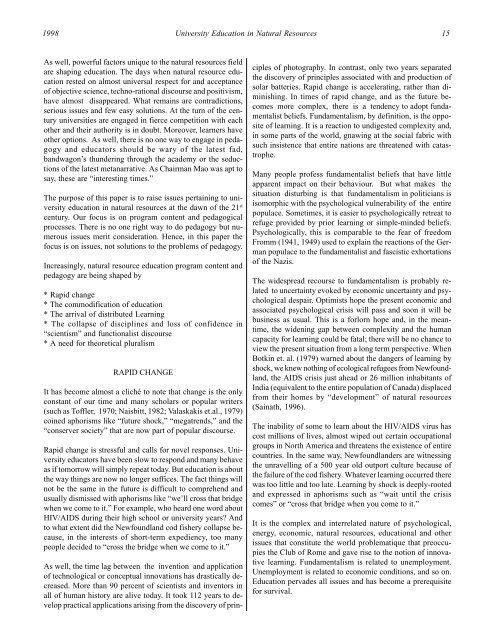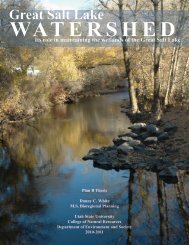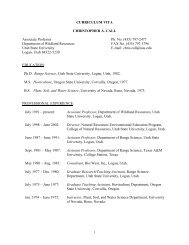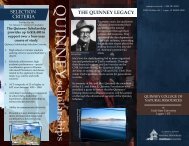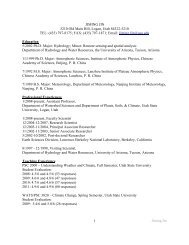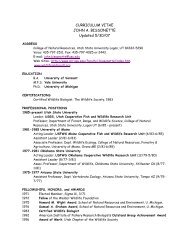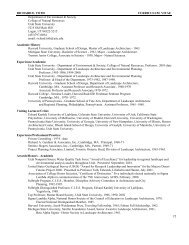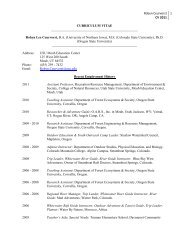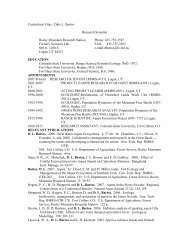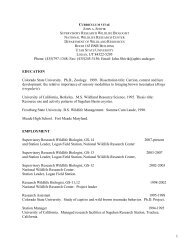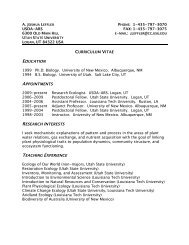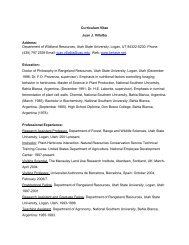University Education in Natural Resources - CNR Home - Utah State ...
University Education in Natural Resources - CNR Home - Utah State ...
University Education in Natural Resources - CNR Home - Utah State ...
Create successful ePaper yourself
Turn your PDF publications into a flip-book with our unique Google optimized e-Paper software.
1998<br />
<strong>University</strong> <strong>Education</strong> <strong>in</strong> <strong>Natural</strong> <strong>Resources</strong> 15<br />
As well, powerful factors unique to the natural resources field<br />
are shap<strong>in</strong>g education. The days when natural resource education<br />
rested on almost universal respect for and acceptance<br />
of objective science, techno-rational discourse and positivism,<br />
have almost disappeared. What rema<strong>in</strong>s are contradictions,<br />
serious issues and few easy solutions. At the turn of the century<br />
universities are engaged <strong>in</strong> fierce competition with each<br />
other and their authority is <strong>in</strong> doubt. Moreover, learners have<br />
other options. As well, there is no one way to engage <strong>in</strong> pedagogy<br />
and educators should be wary of the latest fad,<br />
bandwagon’s thunder<strong>in</strong>g through the academy or the seductions<br />
of the latest metanarrative. As Chairman Mao was apt to<br />
say, these are “<strong>in</strong>terest<strong>in</strong>g times.”<br />
The purpose of this paper is to raise issues perta<strong>in</strong><strong>in</strong>g to university<br />
education <strong>in</strong> natural resources at the dawn of the 21 st<br />
century. Our focus is on program content and pedagogical<br />
processes. There is no one right way to do pedagogy but numerous<br />
issues merit consideration. Hence, <strong>in</strong> this paper the<br />
focus is on issues, not solutions to the problems of pedagogy.<br />
Increas<strong>in</strong>gly, natural resource education program content and<br />
pedagogy are be<strong>in</strong>g shaped by<br />
* Rapid change<br />
* The commodification of education<br />
* The arrival of distributed Learn<strong>in</strong>g<br />
* The collapse of discipl<strong>in</strong>es and loss of confidence <strong>in</strong><br />
“scientism” and functionalist discourse<br />
* A need for theoretical pluralism<br />
RAPID CHANGE<br />
It has become almost a cliché to note that change is the only<br />
constant of our time and many scholars or popular writers<br />
(such as Toffler, 1970; Naisbitt, 1982; Valaskakis et.al., 1979)<br />
co<strong>in</strong>ed aphorisms like “future shock,” “megatrends,” and the<br />
“conserver society” that are now part of popular discourse.<br />
Rapid change is stressful and calls for novel responses. <strong>University</strong><br />
educators have been slow to respond and many behave<br />
as if tomorrow will simply repeat today. But education is about<br />
the way th<strong>in</strong>gs are now no longer suffices. The fact th<strong>in</strong>gs will<br />
not be the same <strong>in</strong> the future is difficult to comprehend and<br />
usually dismissed with aphorisms like “we’ll cross that bridge<br />
when we come to it.” For example, who heard one word about<br />
HIV/AIDS dur<strong>in</strong>g their high school or university years? And<br />
to what extent did the Newfoundland cod fishery collapse because,<br />
<strong>in</strong> the <strong>in</strong>terests of short-term expediency, too many<br />
people decided to “cross the bridge when we come to it.”<br />
As well, the time lag between the <strong>in</strong>vention and application<br />
of technological or conceptual <strong>in</strong>novations has drastically decreased.<br />
More than 90 percent of scientists and <strong>in</strong>ventors <strong>in</strong><br />
all of human history are alive today. It took 112 years to develop<br />
practical applications aris<strong>in</strong>g from the discovery of pr<strong>in</strong>ciples<br />
of photography. In contrast, only two years separated<br />
the discovery of pr<strong>in</strong>ciples associated with and production of<br />
solar batteries. Rapid change is accelerat<strong>in</strong>g, rather than dim<strong>in</strong>ish<strong>in</strong>g.<br />
In times of rapid change, and as the future becomes<br />
more complex, there is a tendency to adopt fundamentalist<br />
beliefs. Fundamentalism, by def<strong>in</strong>ition, is the opposite<br />
of learn<strong>in</strong>g. It is a reaction to undigested complexity and,<br />
<strong>in</strong> some parts of the world, gnaw<strong>in</strong>g at the social fabric with<br />
such <strong>in</strong>sistence that entire nations are threatened with catastrophe.<br />
Many people profess fundamentalist beliefs that have little<br />
apparent impact on their behaviour. But what makes the<br />
situation disturb<strong>in</strong>g is that fundamentalism <strong>in</strong> politicians is<br />
isomorphic with the psychological vulnerability of the entire<br />
populace. Sometimes, it is easier to psychologically retreat to<br />
refuge provided by prior learn<strong>in</strong>g or simple-m<strong>in</strong>ded beliefs.<br />
Psychologically, this is comparable to the fear of freedom<br />
Fromm (1941, 1949) used to expla<strong>in</strong> the reactions of the German<br />
populace to the fundamentalist and fascistic exhortations<br />
of the Nazis.<br />
The widespread recourse to fundamentalism is probably related<br />
to uncerta<strong>in</strong>ty evoked by economic uncerta<strong>in</strong>ty and psychological<br />
despair. Optimists hope the present economic and<br />
associated psychological crisis will pass and soon it will be<br />
bus<strong>in</strong>ess as usual. This is a forlorn hope and, <strong>in</strong> the meantime,<br />
the widen<strong>in</strong>g gap between complexity and the human<br />
capacity for learn<strong>in</strong>g could be fatal; there will be no chance to<br />
view the present situation from a long term perspective. When<br />
Botk<strong>in</strong> et. al. (1979) warned about the dangers of learn<strong>in</strong>g by<br />
shock, we knew noth<strong>in</strong>g of ecological refugees from Newfoundland,<br />
the AIDS crisis just ahead or 26 million <strong>in</strong>habitants of<br />
India (equivalent to the entire population of Canada) displaced<br />
from their homes by “development” of natural resources<br />
(Sa<strong>in</strong>ath, 1996).<br />
The <strong>in</strong>ability of some to learn about the HIV/AIDS virus has<br />
cost millions of lives, almost wiped out certa<strong>in</strong> occupational<br />
groups <strong>in</strong> North America and threatens the existence of entire<br />
countries. In the same way, Newfoundlanders are witness<strong>in</strong>g<br />
the unravell<strong>in</strong>g of a 500 year old outport culture because of<br />
the failure of the cod fishery. Whatever learn<strong>in</strong>g occurred there<br />
was too little and too late. Learn<strong>in</strong>g by shock is deeply-rooted<br />
and expressed <strong>in</strong> aphorisms such as “wait until the crisis<br />
comes” or “cross that bridge when you come to it.”<br />
It is the complex and <strong>in</strong>terrelated nature of psychological,<br />
energy, economic, natural resources, educational and other<br />
issues that constitute the world problematique that preoccupies<br />
the Club of Rome and gave rise to the notion of <strong>in</strong>novative<br />
learn<strong>in</strong>g. Fundamentalism is related to unemployment.<br />
Unemployment is related to economic conditions, and so on.<br />
<strong>Education</strong> pervades all issues and has become a prerequisite<br />
for survival.


